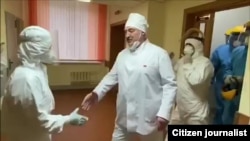Shaky confidence in the government’s assurances about vaccines appears to be depressing Belarus' vaccination rate to one of the lowest in Eastern Europe, further endangering a public health care system already "clogged up" by COVID-19 cases, some Belarusian physicians claim.
With just under 21.2 percent of its population of roughly 9.4 million people fully vaccinated, according to the John Hopkins Coronavirus Resource Center, Belarus has the lowest vaccination rate of any of its five immediate neighbors (Latvia, Lithuania, Poland, Russia, Ukraine) except for Ukraine (17.36 percent). Its vaccination rate is less than half that of Poland, a European Union member with over four times its population, as well as of far smaller EU members Latvia and Lithuania.
Belarus officially posts the lowest daily infection rate out of that group – less than 2,000 new cases, as of November 3. But persistent online reports of shortages of medicine, oxygen, and hospital beds suggest a different reality.
Despite these reports, although Belarusians can be vaccinated free of charge – and often receive financial incentives from employers to do so – many categorically refuse coronavirus vaccines. An online poll of 2,000 Belarusians conducted by Berlin’s non-governmental Centre for East European and International Studies (ZOiS) found in June 2021 that “nearly half” of those surveyed were not willing to be vaccinated, ZOiS staff wrote in a November 3 commentary for The Conversation.
Wariness toward the two vaccines available in Belarus -- the Russian-made Sputnik V, which Belarus itself now manufactures, and China’s Sinopharm -- could factor into that reluctance. Only 20 percent of the ZOiS respondents stated they would take a Russian vaccine and still fewer a Chinese vaccine. To those surveyed, vaccines from Germany (43 percent), the United Kingdom (30 percent), and the United States (27 percent) seemed the most trustworthy.
Belarus’ Alyaksandr Lukashenka, who says he supports vaccination but not vaccine mandates, does not support catering to such views to increase Belarus’ vaccination rate, however.
Political opposition to his de facto rule appears to drive that reasoning. During an October 26 visit to the Lida Central Regional Hospital in western Belarus, the unvaccinated Lukashenka declared that Belarus will not offer vaccines produced in Western Europe or the United States because, he alleged, that will enable Belarusians to enter the West “to receive instructions.”
The 67-year-old politician claims that Western governments engineered opposition to his official 2020 reelection as president to remove him from power.
“That’s why they need this!” he said, in reference to proposals for Belarus to import Pfizer, Johnson & Johnson, Moderna, and other Western-made vaccines.
Sputnik and Sinopharm are “no worse” than such vaccine and have performed “far better,” Lukashenka asserted.
In December 2020, Belarus became the first country outside of Russia to register the Sputnik vaccine for public use. Its pharmaceutical industry began manufacturing the vaccine itself in May 2021.
But the fact that Belarus imports the vaccine’s components prompts some Belarusians to doubt the end-product’s reliability, commented Dr. Vladimir Martov, who formerly ran the Vitebsk City Clinical Emergency Hospital’s anesthesiology and reanimation department.
“It’s one thing to create a vaccine, it’s another thing to smooth out its production,” Martov continued. “And when they began to prepare Sputnik in Belarus, then, of course, there’s no trust.”
In Belarus, once a pharmaceutical product is registered officially, pharmaceutical manufacturers often start using lower-quality ingredients with weaker concentrations to save money, charged physician Olga Sadovskaya, a former clinical pharmacist in Minsk’s City Hospital No. 6.
Belarus does not have a strict system for monitoring the quality of retailed medicines, added Sadovskaya. While the Belarusian Sputnik may be “more or less OK,” no proof exists for that, she said.
Against that backdrop, officials’ steadfast promotion of Sputnik led many Belarusians to sense that “something is not on the level” about the Russian vaccine, claimed Martov, citing reports of inconsistent quality.
Belarusians often believe that you should do the opposite of whatever you hear from the government, added Sadovskaya.
“It’s funny when people at these meetings say that you have to be vaccinated, but they themselves are sitting there without masks,” commented one Minsk resident, who requested to be identified only by her first name, Darya.
The government’s constantly changing policies on pandemic restrictions add to the problem, agrees Sadovskaya, who emigrated to Poland after being detained for participating in unauthorized anti-government protests.
Officials first denied COVID-19’s existence, then recognized it and imposed mask mandates. Now, the country has dropped mask mandates altogether and emphasizes that the pandemic is manageable, even as doctors report shortages of medicines, hospital beds, and oxygen.
“Naturally, when the information changes every day, then, in principle, you stop trusting even adequate and truthful information,” commented Sadovskaya.
Questions also have surfaced about the reliability of Belarus’ official coronavirus numbers. Based on official data, Belarus to date has suffered only 4,679 deaths from the disease, the lowest death tally in its region apart from Latvia, a country of just over 1.9 million people.
Government data leaked by hackers this summer, however, indicated that Belarus had 32,000 more deaths than expected between March 2020 and March 2021 -- an excess mortality rate more than 14 times higher than officials claimed, Current Time reported.
The Belarusian Ministry of Health did not respond to requests for comment.
The ministry’s recent actions indicate that Belarus’ coronavirus experience is worsening. The Ministry of Health has stopped the export of all medical oxygen and has ended public hospitals’ provision of routine medical care. Preventative medical checkups by outpatient clinics and hospitals ended in late September to accommodate coronavirus patients.
Yet, rather than focus on these struggles, Belarusian state media, which dominate the country’s news sector, emphasize problems elsewhere. “The health care systems of many countries do not withstand the test of strength,” the state-run TV channel Belarus 1 declared on October 20.
An intensive care physician at the Vitebsk City Clinical Emergency Hospital, however, shared a different story. Doctors in the northeastern city are seeing “a significant difference” from earlier waves of the pandemic, according to Dr. Rostislav Savitsky.
Patients are younger, often under 40 years old, and frequently require oxygen assistance. An increase in the death rate, including among young people, “worries us extremely,” Savitsky added.
On average, 10 people per day now die from COVID-19 in Savitsky’s hospital alone, the physician said on October 25. That compares with an official daily death rate of 16-17 people nationwide.
Dr. Savitsky also reported shortages of anti-coagulants, which prevent blood clots, and other medications, as well as hospital beds and oxygen.
A senior health ministry official, Alyaksey Shcherbinsky, claimed, however, on November 2 that “the pandemic vector begins to change.” Hospitalizations have decreased by 2-10 percent over the last seven to nine days “in some regions,” Shcherbinsky said.
Lukashenka has deemed the development of a Belarusian vaccine “a good decision” that could further any progress in combatting the pandemic.
The National Research Center of Epidemiology and Microbiology announced on November 3 that an “experimental batch” of this vaccine had proven “safe and immunogenic.” The Center predicted that a trial supply will be manufactured in 2022 and the vaccine should go into distribution in 2023.
That appears unlikely to reassure Belarusian physicians like Martov. With people now “standing in lines for hospitalization,” any push for vaccination and other measures to prevent overburdening the health-care system should have begun in the summer, before the start of a fourth COVID-19 wave, he said.
“The collapse has already happened,” Martov asserted.
This story was written by Current Time English Editor Elizabeth Owen based on Current Time Digital Editor Alena Shalayeva's November 1 "Услышал от государства – сделай наоборот". Почему белорусы не хотят вакцинироваться and additional reporting by Current Time's Footage Vs. Footage, Volodymyr Mykhailov, and Andrei Soshnikov. It also includes reporting from BelTA and Reuters.







